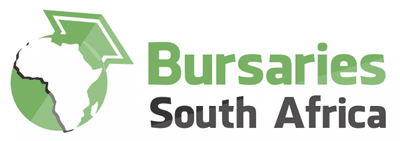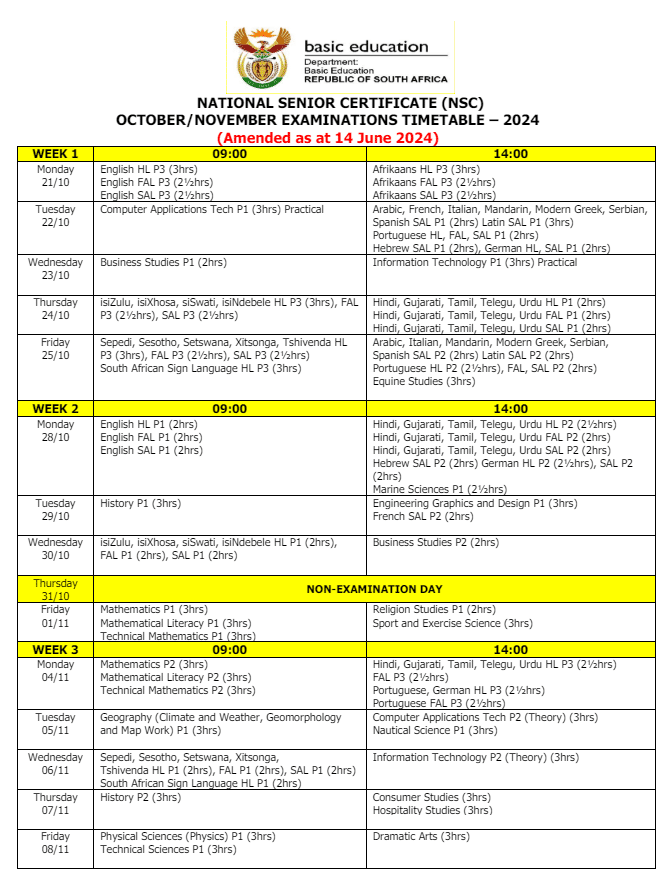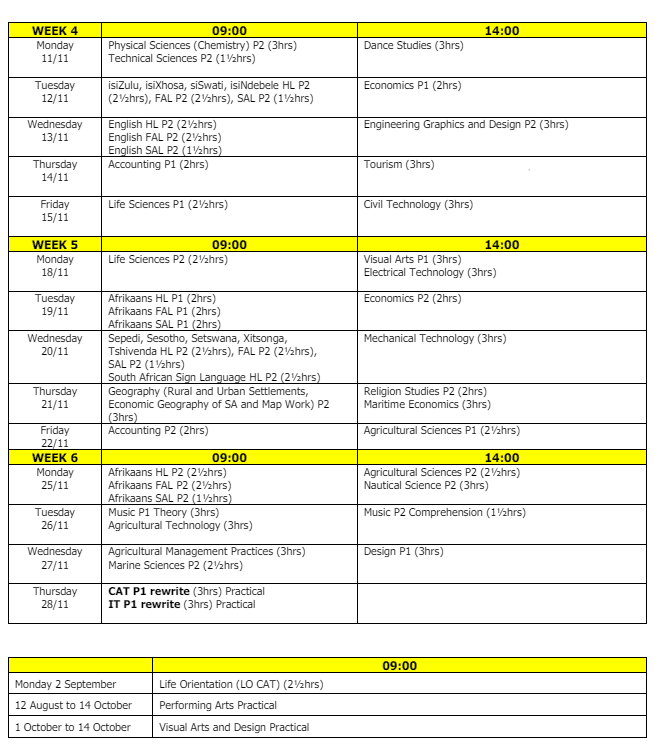Matric NSC Final Exam Preparation & 2024 Timetable
This article was updated on 10 July 2024.
Now that we have entered the third term of 2024, the Matric National Senior Certificate (NSC) final examinations will be soon approaching and preparations should be underway.
Matric final exams are a very important time in a students life, as they will determine whether they can gain entrance into university (or other higher education institutions), and whether they will secure funding.
If you are in Matric this year (or your child is in Matric), this article will surely help you. In this article, we will share the final NSC exam timetable for 2024, past exam papers and memos, as well as answer some common NSC questions.
What is an NSC?
Firstly, the National Senior Certificate (NSC) is a South African Qualification achieved by learners who pass Grade 12 (Matric) in High School. Students generally complete an NSC in 3 to 5 years, which includes studies done in 3 Grades: Grade 10, Grade 11 and Grade 12.
When do Matric final exams begin in 2024?
The NSC exams will run for 6 weeks, beginning on 21 October, with English and Afrikaans Paper 3. The exams will end on 27 November 2024.
Download the final Matric NSC Final Exam Timetable 2024 (.pdf)
Past exam papers and memorandums for Matric NSC exam revision:
Past exam papers can be found on the Western Cape government website. These examination papers (as well as memos and answer books where applicable), are for Matric National Senior Certificate (NSC), from 2016 to 2021.
Past papers are a great resource to revise and prepare for the upcoming NSC exams. They can be used to find out what you already know and what you don’t know.
Additional NSC exam preparation: Mind the Gap study guides
The Department of Basic Education have compiled study guides for all subjects (called “Mind the Gap study guide”), which will help students prepare for their final CAPS 12 exams.
These study guides do not cover the entire CAPS curriculum, instead they focus on core content of each knowledge area and show students where they can earn easy marks.
Students are encouraged to work their way through these guides in order to improve their understanding, identify areas of weakness and correct their own mistakes.
Download the Mind the Gap study guides here
Who can write the NSC exams?
The NSC exam is open to:
- all current Grade 12/ Matric learners
- anyone who would like to improve their previous NSC results and who is still a NSC candidate (they have not had their certificate changed to SC) – they may register as a part-time candidate for the NSC exam
What subjects will I be tested on in the NSC exams?
All students will write the 4 compulsory exams, which include: one Home Language, one First Additional Language, Mathematics or Mathematical Literacy, Life Orientation and either English or Afrikaans as one of your languages.
The other exams will be made up of your 3 subject electives (read about subject choices from the DBE).
What are the minimum criteria to receive an NSC?
There are 3 level passes students can achieve:
1) Higher certificate pass: the lowest level of pass, which requires students to pass a minimum of 6 out of 7 subjects. Students must achieve a minimum of: 40% for their Home Language, 40% in two other subjects and 30% in four other subjects.
2) Diploma pass: which requires students to pass a minimum of 6 out of 7 subjects. Students must achieve a minimum of: 40% for their Home Language, 40% in three other subjects (excluding Life Orientation) and 30% in the Language of Learning and Teaching (LOLT) of the tertiary institution.
3) Bachelor’s Degree pass: the highest level of a pass, which requires students to pass a minimum of 6 out of 7 subjects. Students must achieve a minimum of: 40% for their Home Language, 50% in four other subjects (excluding Life Orientation), 30% in Language of Learning and Teaching (LOLT) of the tertiary and 30% in one other subject.
What pass level do I need in order to study further after Matric?
Students who wish to pursue further studies at a University, University of Technology, TVET College, or any accredited Higher Learning Institution after Matric, must achieve a Bachelor’s Degree Pass in their NSC exams. This will make them eligible to apply for degree studies (students should note that there are additional requirements for certain degrees, eg. Medicine, Engineering and certain Science qualifications).
What is the level system and what do the grades mean?
The level system is a scale of achievement for the NSC. The level system records and reports results for Grades R to Grade 12, implemented from 2013:
- Level 7: 80–100% (Outstanding achievement)
- Level 6: 70–79% (Meritorious achievement)
- Level 5: 60–69% (Substantial achievement)
- Level 4: 50–59% (Moderate achievement)
- Level 3: 40–49% (Adequate achievement)
- Level 2: 30–39% (Elementary achievement)
- Level 1: 0–29% (Not achieved: Fail)
What is the difference between NSC and SC?
The difference between the NSC and the SC is that the National Senior Certificate (NSC) is a high school-leaving certificate which requires high school learners to complete examinations and the School-Based Assessment, while the Senior Certificate (SC) is for adult learners who are 21 years and older (also known as Adult Matric) and is based only on examinations.
** TIPS & ARTICLES **
Read our top tips on submitting your bursary application for the best chance of success.
Read our tips on how to write a bursary motivational letter here.
Read about how to prepare for a bursary interview here here.
Read about the various ways to get free education in South Africa.
Read about the Public vs Private Higher Education Institutions and which to choose.
Read about the National Benchmark Test (NBT) for University Entrance.
Are you following us on social media? We post our latest bursary opportunities and reminders of bursaries closing soon on Facebook, Twitter and Instagram.





